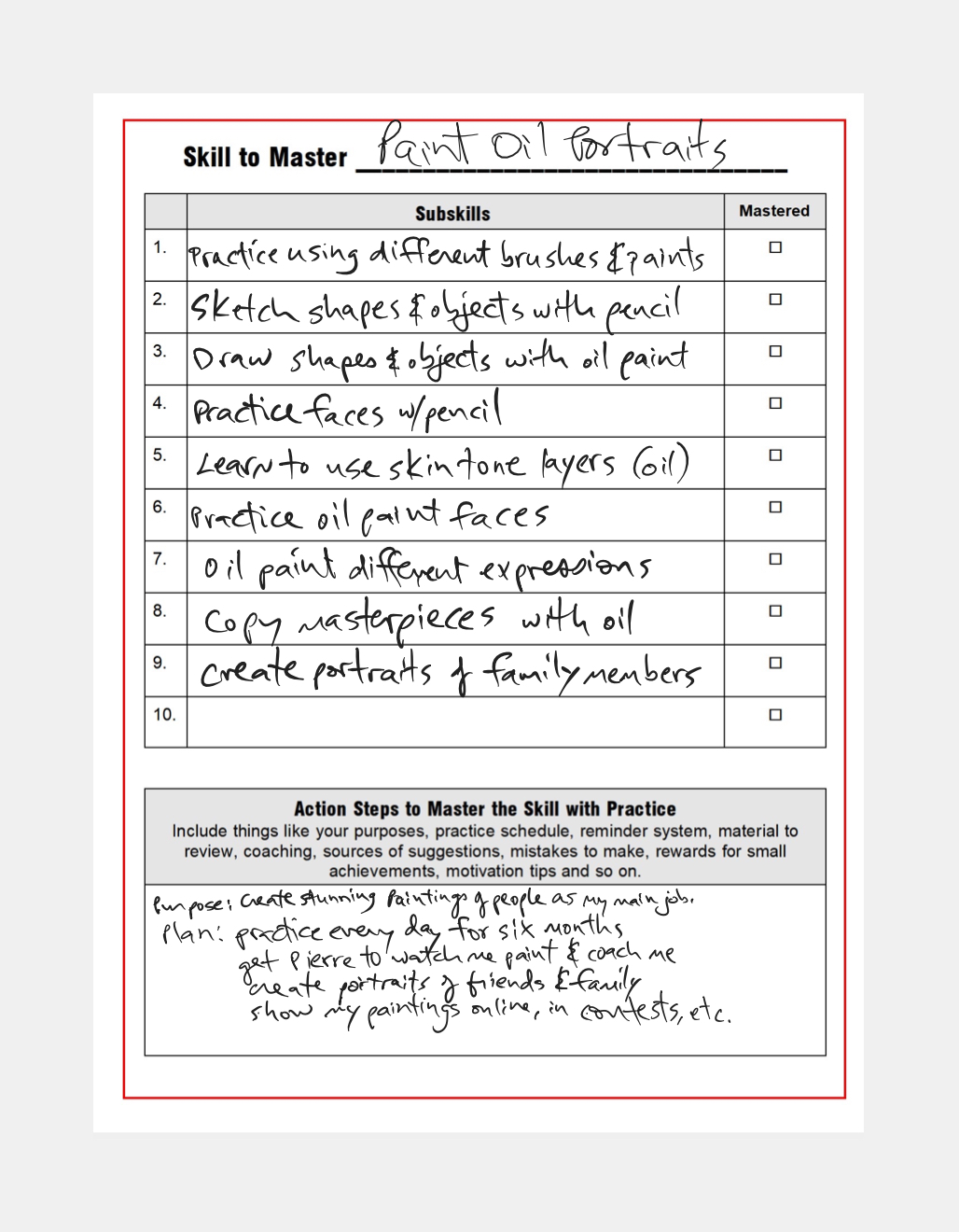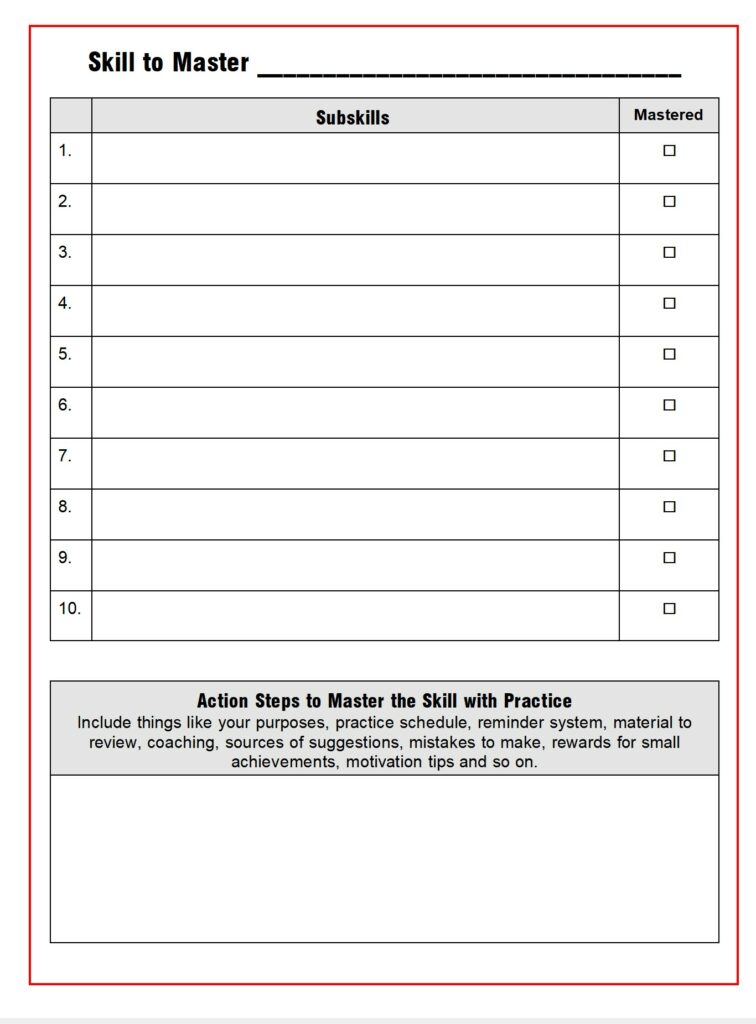How to Master Any Skill
Step 5: Practice
Now that you can pick the right material for your skill, understand every word in that material and connect the ideas in your material to reality, you are ready for this final step: practice.
Practice trains your mind and body to make the steps as natural as a good habit.
“One can train one’s body, one’s eyes, one’s hands and feet until, with practice, they sort of ‘get to know.’ One no longer has to ‘think’ to set up the stove or park the car: one just DOES it.” — L. Ron Hubbard
When you’re learning something new, it feels awkward at first. You have to think about every step. But as you practice, your body and mind begin to work together. Soon, you don’t have to think about it anymore—you just do it.
Practicing is vital to mastering any skill. You attract the most attention when you practice your communication skills. You earn the most money when you practice your work or management skills. You become a professional in your field by practicing, practicing, practicing.
Fortunately, it can be a lot of fun!
 For example, you are mastering the skill of painting cars. You have read some excellent books, finished an online course and watched dozens of videos. Your brother says you can paint his old car, but first, you MUST practice.
For example, you are mastering the skill of painting cars. You have read some excellent books, finished an online course and watched dozens of videos. Your brother says you can paint his old car, but first, you MUST practice.
So you practice the individual steps of painting a car so you will do a good job for your brother.
To do this, you go to a car paint shop and get some ruined fenders and hoods from their scrap pile. You sand out the rust spots, fix some dents and use your paint sprayer. You have fun trying silly ideas and deliberately making mistakes. You practice for dozens of hours until you can make any old fender look new and beautiful, every time.
Now you practice on every part of old cars until you master the skill.
Every Skill You Wish to Master Can Be Practiced
“The same principle applies to professions which mainly use the mind.” “The right answer is to practice, practice and practice!” — L. Ron Hubbard from The Way to Happiness
Five Examples
1. Public Speaking
Practice by talking in front of friends or recording yourself telling stories and speaking on a topic. Join groups like Toastmasters or practice with a mirror. Work on standing tall, speaking clearly and using hand gestures to make your points.
2. Digital Marketing
Practice by creating a small ad campaign on Facebook or Google. Make a blog or social media account and try to grow your followers. Check what works and doesn’t by looking at the numbers, such as “Likes,” views or clicks, and make changes.
3. Forming New Relationships
Practice meeting a stranger by finding things you like about the person and then talking about those things.
4. Software Programming
Pick a coding language, like “Python,” and create small projects, like a calculator. Use online challenges from websites like Codecademy to practice solving problems until you master the code.
5. Wealth Building
Practice by starting to track how much you spend and save each month. Use apps or spreadsheets to make a simple budget. Pretend to invest in stocks or other things and watch how they grow or shrink over time.
.
Six Benefits
- The more you practice, the greater your confidence. You know that you know.
- Because you constantly imagine using the skill while practicing, you make better decisions.
- You are faster and more efficient than those who do not practice.
- Because you practice despite distractions, you will be more focused and less distracted when using your skill.
- You can estimate how how hard and how long tasks will take you to do.
- You can set realistic goals that use your skills, and make steady progress toward them.
Four Success Stories
 1. Pop music’s superstar singer and composer Ed Sheeran started his career by practicing on sidewalks, day after day. He says he practiced singing for 30,000 hours before he became famous.
1. Pop music’s superstar singer and composer Ed Sheeran started his career by practicing on sidewalks, day after day. He says he practiced singing for 30,000 hours before he became famous.
2. Writer Stephen King practiced his writing skill by producing thousands of words, every day, for decades. His habit of daily writing has made him one of the most successful authors of all time.
 3. Michael Jordan did not play well enough to play for his high school team, so he practiced his basketball moves for more hours every day than anyone else in the game. As a result, he became the best basketball player of all time.
3. Michael Jordan did not play well enough to play for his high school team, so he practiced his basketball moves for more hours every day than anyone else in the game. As a result, he became the best basketball player of all time.
4. Abraham Lincoln practiced his speeches for thousands of hours. He wrote, memorized and practiced speeches for his trials as an attorney, for political debates and for public events as the U.S. President. Lincoln and his speeches are an important part of American history.
Warning!
If practicing seems too difficult for you to do, review the earlier steps.
- Did you find the best material to learn the skill (Step #1)?
- Do you understand every word and every sentence of that material (Step #2)?
- Can you connect the information to reality (Step #3)?
- Did you learn at a good speed, not too fast or too slow (Step #4)?
Once you have completed the earlier steps, you feel MOTIVATED to try out what you know. Practicing is a terrific opportunity to use what you have learned. It should be enjoyable!
.
Ten Steps for Successful Practice
1. Write down the skill you wish to master at the top of a document.
Click the worksheet for a larger version. You can also download the worksheet as a PDF or Microsoft Word Doc.
2. Break down the skill into small individual skills or “subskills.”
If you master each subskill, you master the big skill.
For example, to be a great soccer player, you need to practice hundreds of subskills including 50 different types of kicks. To be a great accountant, you need to master subskills in math, law, accounting software AND certain people skills.
Create your list of subskills from your study material. Put the easiest ones at the top.
AI chatbots can help you create a list of subskills. Go to Open AI’s ChatGPT, Microsoft’s Copilot, Google’s Gemini or Meta’s AI Llama and ask this question: “I want to master [insert skill here]. Can you give me a list of things to practice, starting with the easiest and ending with the hardest, to help me master this skill? Make each step a specific task I can do.”
3. Write down an Action Plan to master the skill with practice.
Include your purpose for mastering the skill, practice schedule, reminder system, material to review, who you will BE, coaching, feedback, mistakes to handle, rewards, motivation tips and so on.
Example steps: “Practice every day from 10-11 AM.” “Review my material on ___ before each practice session.” “See if my dad can coach me for an hour every Saturday.”
4. Practice your subskills for as much time as possible, every day.
At the start of each practice session, BE a master. This helps you DO what you need to DO so you will HAVE the skill.
Next, decide on a goal for the session. What do you want to accomplish today?
Practice the subskill you need to master again and again and again until you accomplish the session’s goal.
5. Each time you master a subskill, pat yourself on the back or give yourself a small reward, and then jump into the next one.
6. Learn from mistakes.
Find lessons from all of your mistakes. In fact, try to make every mistake possible when practicing. With each mistake, observe what happens, how to fix any damage and learn how to not repeat it.
7. Get a coach.
Anyone who wants to help you may be a good coach, but consider hiring a professional coach. The best coaches are masters in the skill AND have coaching skills. Be VERY grateful to coaches.
8. Get suggestions.
In addition to getting a coach, get observations and ideas from coworkers, friends, teachers, masters or anyone who can give useful suggestions. Ask them to watch you practice in person, review your practicing, etc.
9. Depending on the skill, finish this practice step with an apprenticeship or internship.
Get an established master to help you master the skill. During an apprenticeship or internship you try out what you have learned and practiced. You get expert supervision and advice.
Be prepared to spend a year or more watching, learning and practicing.
For example, a new electrician spends a year working under a licensed electrician learning how to install wiring for a house, a warehouse and an office building.
Or a new lawyer does an internship with a successful lawyer or a judge. During the internship, he or she learns how to work with government courtroom employees, how to talk to clients and what to do during trials.
10. Practice until you master the skill.
Practice, practice, practice until you can do the entire skill. Perfectly, every time, without thinking.
This final step to master a skill with practice can take weeks, months or even years of work. So be willing to do whatever you need to do.
When you have completed this step on practice, the skill is part of you.
You are now a MASTER!

Next: Feedback Form
Last Step: #4 “Study at Your Best Speed.”

